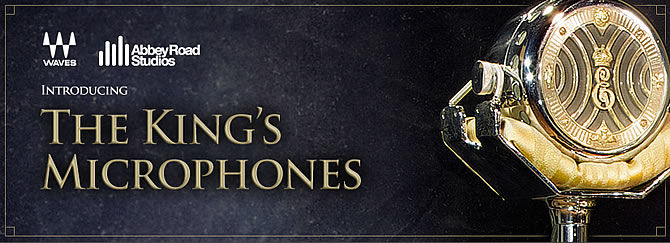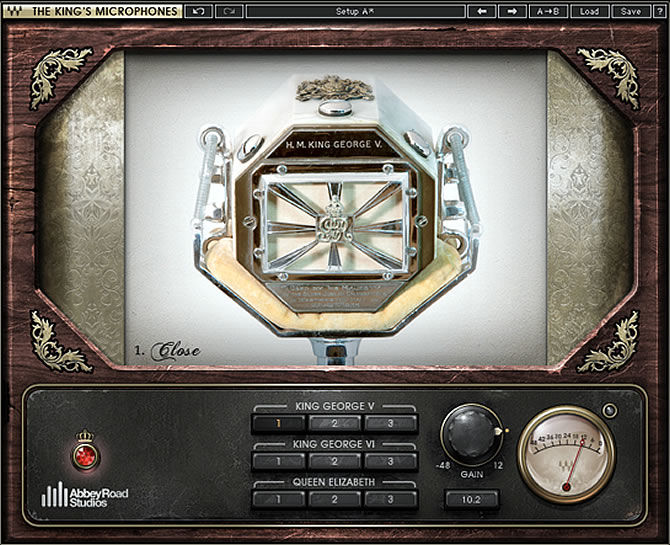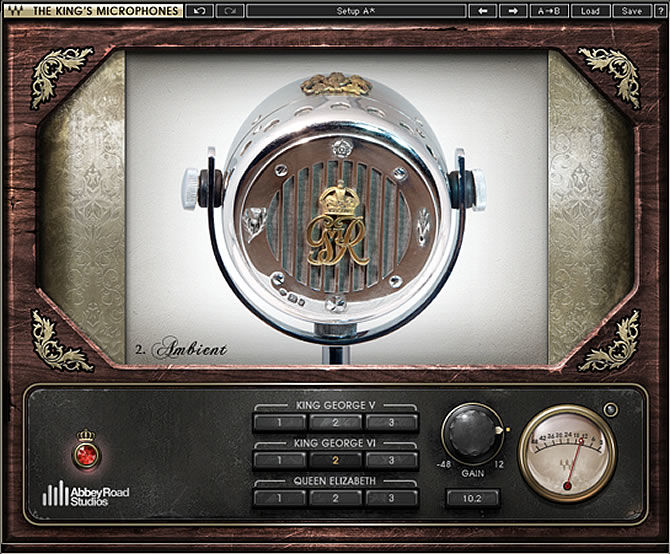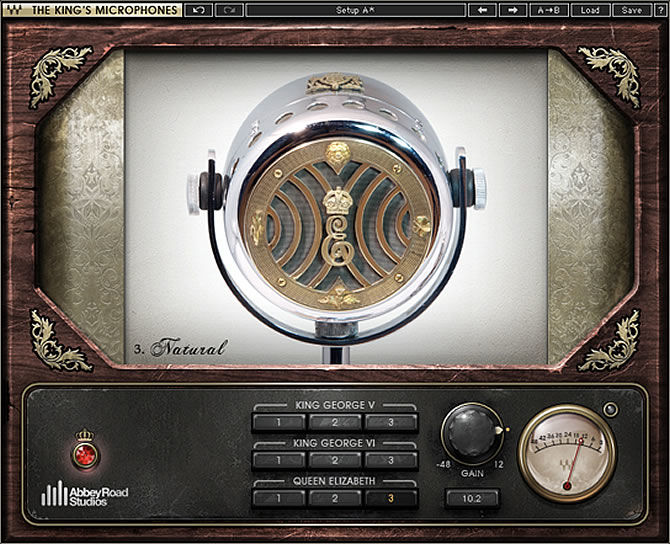We have a new member of the big family of Waves Plugins. Featuring for the first time Abbey Road Studios, Waves Audio Ltd. has launched The King’s Microphones Plugin – the emulation plugin for the sounds of the majestic microphones used in the award winning film … The King’s Speach.
“Last year, I had the fantastic opportunity to use the microphones built for the British Royal family whilst recording the score for The King’s Speech. This year I am proud that the combined efforts of Abbey Road Studios and Waves have produced a wonderful authentic plug-in that captures the very essence of these beautiful and rare microphones.” said Peter Cobbin, senior recording engineer at Abbey Road Studios (Harry Potter, The Lord of the Rings, The Beatles and many, many more)
The Waves Abbey Road – The King’s Microphones plugin is a digital audio processor, created in concept by Abbey Road Studios and engineered by Waves. The plugin is based on three historical microphones now held by The EMI Archive Trust, which belong to the royal family and were used by its members in public addresses.

The microphones are:
o King George V (circa 1925) – Carbon microphone
o King George VI (circa 1936) – Dynamic moving coil microphone
o Queen Elizabeth (circa 1936) – Dynamic moving coil microphone

H.M. King George V model:
This Carbon microphone was designed by Marconi–Reisz circa 1925. It is comprised of fine carbon dust held between output electrodes, fronted by a mica diaphragm and encased in a grand marble shell. The microphone needs a constant DC voltage which can be achieved today with a domestic 9v battery.
Carbon microphones are rarely used today. Despite this model’s limited bandwidth and relatively high noise floor it was one of the best microphones available at the time, therefore this particular microphone has a wonderful coloured sound unlike any manufactured today.

H.M. King George VI and H.M. Queen Elizabeth models:
Both of these microphones are based on the EMI CPM201 model. These moving coil microphones were specially built-in 1936, encased in silver by G & S Co Ltd of London. The front grill bears individual insignia of GRVI (George Rex VI) and E (Elizabeth) and the top of the silver ‘headlamp’ style microphone is adorned with the Royal coat of arms.
The diaphragm is made of PVC and shaped almost like a loud-speaker cone. It is presumed these microphones were designed for outside broadcast, as they are more robust than the more popular ribbon microphones of the time.

Use on Sessions Today
These Royal microphones and many other fascinating EMI memorabilia and equipment are held in special storage by the EMI Archive Trust, based in Hayes. Peter Cobbin, Abbey Road Studios’ Senior Engineer, was visiting the archives about 12 years ago when he noticed an ornate box on one of the shelves. Upon asking, he was told that it housed a microphone made for King George the V.
Peter thought nothing more of this until recently, when composer Alexandre Desplat asked him to record the score for the award-winning film ‘The King’s Speech’. Remembering what he had found over a decade earlier, Peter was keen to borrow the King George V microphone for inspiration during the film’s recording sessions in Studio One.
He was delighted to discover that in addition to microphones created for King George V and Queen Elizabeth, the archives had the microphone used by King George VI, the central character of the film.
The EMI Archive Trust kindly agreed to loan the microphones, and upon their arrival Peter was curious to see if they could actually function. Lester Smith, Abbey Road Studios’ legendary microphone technician, was able to get three of them working.
As three microphones were available, Peter placed these in front of the orchestra in a Decca Tree formation – this became known on the sessions as the Royal Family Tree.
The oldest, King George V was placed in the centre position, with the two moving coil microphones on either side. The King George V carbon microphone has a narrower frequency response and a very special “1920s radio” type sound, which worked beautifully in conjunction with the fuller sounding stereo pair. Each microphone has its own unique sound; the Queen Elizabeth model has a little more bottom end than the King George VI. All three microphones have a beautiful, colourful tone that wowed the film’s director and composer in the control room.
The Royal Tree was used extensively on the music mix for the film (in conjunction with more traditional orchestral microphones). The director was so impressed by the sound these microphones produced he was determined to find a way of using this unique quality for the film’s speeches. Keeping in mind the film’s dub mix was already underway, Peter found a solution to this by re-recording all the flat ‘speech’ dialogue through a speaker and back into the Royal microphones at Abbey Road Studios. It is at this time Peter thought this microphone effect would make a great plug-in.
After the film was finished, it was only too tempting to try these microphones out on other sources to see how they sounded. In the relatively acoustically transparent vocal booth in the Penthouse at Abbey Road Studios, a B&W 802 loudspeaker was set up in front of the microphones. Drums, guitars, vocal and synths were then played and ‘processed’ through the microphones at different proximities.
Peter’s curiosity was rewarded with some fantastic and unique ‘filter’ type effects. The resulting plug-in allows sound designers, engineers, producers and musicians all over the world to give their audio the ‘royal’ treatment!
Pricing and Availability:
The Waves/Abbey Road Studios – The King’s Microphones plugin is now available with a U.S. MSRP of $99.00
You can find more details and a download link for demo on Waves Audio Ltd. Site

